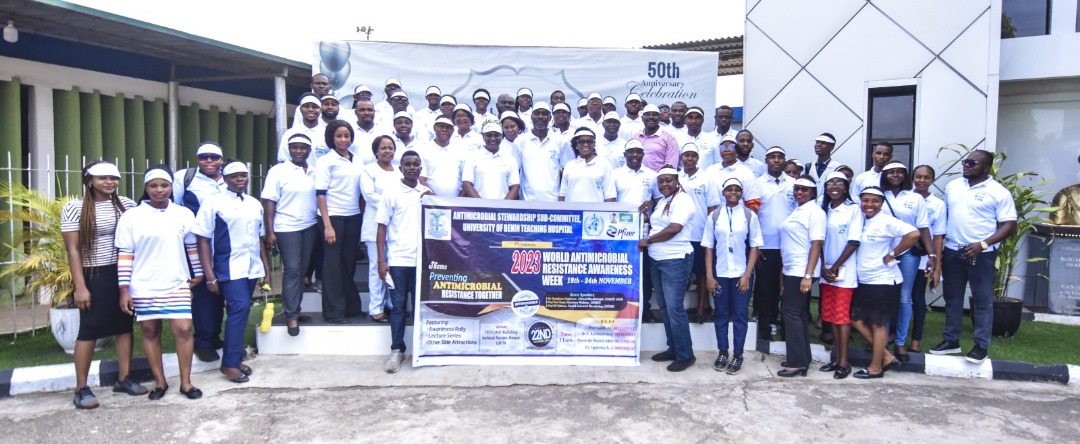
The Antimicrobial Stewardship Sub-Committee of the University of Benin Teaching Hospital (UBTH) Drug and Therapeutics Committee has marked the 2023 World Antimicrobial Resistance Awareness Week with the theme, “Preventing Antimicrobial Resistance Together.”
The week-long program featured a media campaign, awareness walk, patient education, and a lecture series that focused on one health approach (Human, animal and the environment) in mitigating the silent pandemic of antimicrobial resistance (AMR). The event was sponsored by Pfizer pharmaceutical industry company and the Nigeria Center for Disease Control (NCDC).
The program started with online and social media sensitization of the general public featuring individualized pledges to handle antimicrobials with care. This was followed by a rally involving all the stakeholders in UBTH including medical doctors, nurses, pharmacists, medical laboratory scientists, paramedics and students to sensitize the general public on the harmful effects of AMR and the rational use of antimicrobial drugs.
The lecture series featured three scholars from different specialties representing ONE HEALTH.
In his presentation, Prof CE Oshoma, a food and industrial microbiologist at UNIBEN said bacterial antimicrobial resistance is a leading public health threat of the 21st century.
He emphasized among other driving factors of AMR, lack of awareness and knowledge, and lack of enforcement of legislation.
According to Prof CE Oshoma, causes of AMR to the environment include pharmaceutical waste, animal waste, human waste, and pesticides etc.
In another presentation Prof. Paul Nwiyi of the Department of Veterinary Microbiology, UNIBEN opined that the pooling of AMR traits within the ecosystems of different sectors such as human, animal and the environment gave rise to the one health approach.
According to him, there are increasing new AMR microorganisms in animals resulting in animal loss and health hazard to humans who depend on the animal for food.
Dr Osaigbovo Iriagbonse, a consultant clinical microbiologist/ Senior lecturer in the Department of Medical Microbiology UNIBEN/ UBTH, in her speech, expressed worry over the burden Antimicrobial Resistance (AMR), explaining that Africa has the highest mortality rate from of AMR infections in the world with 27 deaths per 100,000 attributable to AMR.
According to her, AMR occurs when antimicrobials that previously cured infections become less effective due to changes in the micro-organisms known as mutations.
Dr. Osaigbovo enumerated the drivers of AMR to include misuse/overuse of antimicrobials, indiscriminate disposal of waste, poor infection control, medical tourism and global travel. She also emphasised that AMR is also emerging in fungi and health workers need to be more aware.
In his speech, Chief Medical Director of the University of Benin Teaching Hospital (UBTH), Prof Darlington Obaseki while presenting awards of excellence to the guest speakers, appreciated members of the antimicrobial stewardship sub-committee led by Dr Stephen Ayinbuomwan for their commitment to improving health outcomes and providing health care solutions in the health system.
The CMD encouraged the committee to do everything possible to make antimicrobial stewardship a culture in UBTH.
On his part, Dr Jerry Igunma consultant clinical Microbiologist and the chairman LOC, UBTH, WAAW 2023 in his vote of thanks appreciated all the stake holders who made the program a success and profusely appreciated the other committee members; Prof AE Sadoh, Dr Osaigbovo I, Pharm Dr, E Yovwin. Mr Ephraim Ibadin, Pharm Aghimien, Dr Adewole Afolabi and Dr Bimbo Opadeyi.
[ad unit=2]






